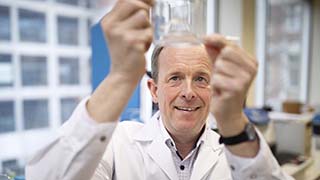Professor Erik Frijlink's research freedom

In the Netherlands, almost all research is directed by grant providers . These funding organizations in a way limit the freedom of researchers, who must adhere to the approved research proposals. Prof. dr. Erik Frijlink, Pharmaceutical Technology and Biopharmacy, University of Groningen (UG) , finances a part of his research from the royalties of his inventions Genuair and Twincer. A sense of freedom.
A few years ago, the University of Groningen sold the rights of Frijlink’s patented Genuair, a powder inhaler against asthma and COPD, to a biopharmaceutical giant. Recently, UG licensed out the rights of the Twincer, a disposable inhaler, as well. And on 1 April 2019, Circassia Pharmaceuticals, a world-class specialty pharmaceutical business focused on respiratory disease, received market approval for the breath-actuated inhaler Pressair® in the United States. Pressair is an innovative variant of the Genuair inhaler. Frijlink: ‘Licensing our powder inhaler invention is really taking off. Worldwide.’
Millions of euros in royalties
The license agreements have provided the University of Groningen with tens of millions of euros in royalties and ensures a constant flow of income in the coming years. Frijlink: ‘The exclusivity rights of a patent are valid for 20 years. You need 10 years to develop and market a medicine, and the next 10 years you can recoup the costs with a nice profit margin.’
The income from royalties for researchers from the University of Groningen and the UMCG is distributed via a fixed ratio: one quarter is placed in the patent fund of the University of Groningen and the UMCG, one quarter goes to the faculty, a part of the royalties goes to the inventors, and finally a part goes to the department of the researcher, free to spend at its own liberty as an incentive for the work carried out. The IP & Business Development team, part of Northern Knowledge, monitors the royalties and supports researchers in the entire process.
Fighting tuberculosis
The income from Genuair and the Twincer royalties allow Frijlink to initiate innovative research on tuberculosis (TB) and other respiratory tract infections. TB is one of the most deadly infectious disease worldwide claiming 1.8 million lives each year. In Frijlink’s lab in Groningen, new antibiotics are being developed which treat people against TB by way of inhalation. Further, every year worldwide around 115,000 children die of the Respiratory Syncytial Virus (RSV). ‘Mortality rates that are preventable,’ believes Frijlink: ‘What is often lacking is funding for new research into stable vaccines. The income from royalties, however, provides me this opportunity.’
Parkinson's disease
The successful professor realistically dreams on: ‘Our patented inhaler techniques are also ideally suited for vaccinations against diseases such as influenza or whooping cough and for administering medication to people suffering from Parkinson's disease.’
Frijlink has great expectations of the clinical trials with a new inhalation technique, the Cyclops, which could also be used to replace the EpiPen. The EpiPen (adrenaline) auto-injectors are intended for the emergency treatment of severe allergic reactions (anaphylaxis) caused by allergens in, for example, food, medicines, insect stings or bites. Frijlink: ‘People are often reluctant to inject themselves. This fear of injection sometimes makes them inject too late, which means that the medicine has no longer the desired effect. The Cyclops inhaler can in this case replace administration through injections.’
Besides having a therapeutic advantage, this invention also has a logistic advantage. Frijlink: ‘The medicine is offered as a dry powder, which keeps the drug stable, it is much cheaper, and it is easier for the patient to carry the Cyclops in his pocket. The EpiPen is a big and inconvenient thing to carry with you.’
Helping mothers in Africa
The money from royalties is also used for new research on drug delivery, for example regarding the controlled delivery of vaccines. ‘That means that you only have to inject once for two administrations," says the professor and director of the Groningen Research Institute of Pharmacy (GRIP).
Technologies which are efficient and cost-saving, but above all they are patient-friendly. ‘In Africa, mothers sometimes have to walk for hours with their babies from home to the clinic to receive their vaccinations against infectious diseases. With the new administration technique they have to go to the medical post less frequent and the product is even more stable than a normal liquid injection.’
Gives you a good feeling
Ground breaking research with social impact funded by royalties from University of Groningen patents. Protection of knowledge leading to new research and innovation. A way of life that must be in the genes of every researcher, says Frijlink: ‘As a researcher at a university, you want to innovate. Inherent to that mission is that you protect the value of your knowledge. Patenting is not a means to an end. Knowledge protection is a result of the work you do.’ In whatever form. ‘Patenting your invention ensures that you have control over your knowledge and that as a researcher you can improve the quality of life and the health of people. That gives you a good feeling.’
IP-Méé with University of Groningen and UMCG! Contact us for support: ip-info@rug.nl
| Last modified: | 20 March 2025 11.03 a.m. |
